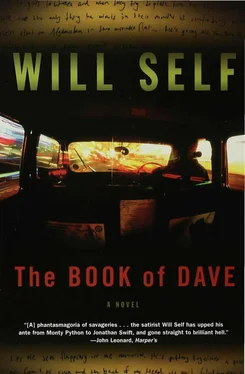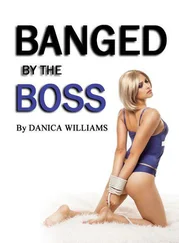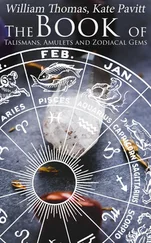When Carl resumed his place at the top of the dyke, Lyttulmun had been tied and dragged across the dusty ground to the gibbet. Here a gang of chavs were straining to winch him up. The next moto had already been selected from the pen, and, as if cowed by Lyttulmun's bellows, she lay submissively, awaiting the Guvnor's blade. One of the London Circuit Drivers came over and turned so that he could watch the abomination die in his mirror. Execrations floated over the wind-smudged wheatie field:
— Bluddë toyist beest! cried one of the blood-spattered chavs beneath the gibbet. Oo duz ee fink ee iz!
Then, quite abruptly, the focus of the action shifted. The Driver struck out with his black arm and screeched: Trap that flyer! Carl followed his quavering finger to where a squat dad had broken from the crowd by the new Shelter and was zigzagging towards the gibbet. Two or three chaps tried in vain to catch the bloke, but in their cumbersome flakjackets, with their railings drawn, they were too clumsy to arrest Gari Funch before he reached the first upright and, with the nimbleness of a true stack-jumper, clambered straight up it.
Gari Funch gained the cross beam and stood upright on it, one foot on each side of the rope from which the dying Lyttulmun hung. Chavs, chaps and Chilmen came running up and made a circle of upturned faces. B4 U kil annuva 1, Gari roared, yaw gonna aff 2 kil me furs! The Drivers and Hamstermen had joined the audience, the former with their backs turned, the latter with their heads bowed. Wivaht ve motos, Gari continued, his fat lips blubbery with emotion, vare aynt no Am ennëwä, so U may az wel tayk me aht inall! Cummon U fukkas — bringiton!
Ees rí, Carl said to Antonë, thass wot ve Dryva wonz, wivaht ve motos vares no Am, an ve PeeSeeO doan wan no Am atall. Carl gathered himself together and stood up on the top of the dyke, fully exposing himself. He took in the whole deranged panorama below: the trapped motos now snorting and lowing in their pen, the saddened Hamsters gathered beneath the gibbet, the steely agents of the PCO. He felt a hatch inside his mind slide open and at long last he heard over the intercom the crackling, unearthly voice of Dave:
— All you have done, the Supreme Driver intoned, all your dad ever did, was to speed the destruction of your beloved island. Be that as it may — you must not blame yourself, my son, for that destruction would have come anyway, sooner or later. You have seen New London! You have witnessed the mighty currents of change that course through its smoky gaffs and muddy alleyways. The Public Carriage Office has no need of motos — nor of the truth. They require only the Book and the Wheel, the Drivers and the Inspectors, the King and his servile lawyers!
The oracular Arpee fell silent — the intercom clicked off. The crowd surrounding the gibbet had caught sight of Carl. At first one or two of the Hamstermen gestured and cried out, then more and more — Drivers, chaps, chavs and Chilmen — turned from Funch to confront this strange apparition. Hearkening to the acclamation, from the bethan gaffs on the near side of the wall, hidden in their cloakyfings, came the mummies of Ham, cowed and terrified. Carl took a deep breath. He needed no intercom to tell him this: that if it hadn't been Dave who so blighted the world, it would've been some other god — Jeebus or Joey or Ali — with his own savage edicts. The only recrimination that Carl allowed himself was to mourn this foolish quest for a dad he'd never known — when right at hand there had always been a bloke who was prepared to be a true father to him. He held out his hand and helped Antonë Böm to stand upright.
— U — U — he struggled to say.
— Eye no, Eye no, Böm replied in comforting Mokni. Eye no.
— U, Uve awlways bin a dad 2 me, Tonë, nah cummon, me öl mayt.
The steady easterly had pushed the cloud up in a massy white bank above the Ferbiddun Zön, so that all of Ham was revealed, a green foetus floating in its amniotic lagoon. It was in bigwatt splendour that the three ill-assorted figures — the slim young dad, the portly queer and the shambling moto — made their way down to the manor and whatever fate awaited them.
16. Made in China: October 2003
Dave Rudman didn't go into town much — and when he did, he took the tube. He walked the six miles from Chipping Ongar to Epping, then got on the train. In mid morning, on a weekday, the tube was the emptiest of places. The ex-cabbie sat alone on the snazzy seats; the rubberized floor at his feet was scattered with flakes of discarded newsprint — the dandruff of current affairs.
With a slappety-clack the train accelerated through sprawling housing estates and satellite towns cluttered with toyist developments — hair-dryer civic centres and filing-tray multi-storey car parks. Slowly at first, then with more and more crashes and bashes, until it reached a crescendo of steel squealing upon steel and threw itself beneath Mile End. The tunnel was at first just cut-and-cover, so that plashes of daylight fell on the soot-blackened walls and worming high-tension cables. Then the train buried still deeper into the scabrous crust of the city — through bloody orange, shitty brown and black bile, down to the London clay. At Bank, Dave took the escalator up to ground level and emerged, a blinking fieldmouse, into the stony kernel of it all. He discovered himself under the pediment of the old Stock Exchange, with getters and secretaries coursing past, greenish flickers on the grey-glass screens of the buildings. Above him an energetic statue of General Smuts struck out for Holborn …
… Yet never got anywhere: his bush hat and cravat were no protection against the smirch of exhaust on his bronze back. Turning his own back on the Bank of England, Dave would sidle down to the river, then idle over one of the bridges. He would only recover any sense of where he was when, leaning over the parapet, he saw the stern of a sightseeing boat disappear beneath it, its wake a foaming gash in the beery water. Straightening up, swivelling — the London diorama pivoted about him: the toothpick steeples and cruet cupolas of the remaining Wren churches, the steel braces and concrete Karnak of Broadgate and the Barbican, the AstroTurf lawns and inflated, latex walls of the Tower, the brass doorknob of the Monument. Downriver a flock of pigeons clattered over the prettified wharves on the south bank, where graduate stevedores in blue striped aprons loaded boudin noir into the holds of German financial engineers.
All day Dave Rudman walked hither and thither. Newly ignorant of London, he attached himself to flocks of tourists, and together with them followed the shepherd's staff of a raised umbrella to where he might listen to a Walloon explanation of St Paul's. Or else he drifted over to South Kensington and sauntered through the museums, slowly absorbing the perverse stratigraphy that had arranged these fossils in horizontal bands, interspersed with gift shops and cafes. Returning to daylight after aeons, Dave threw his head back and allowed the vivid sense of estrangement — which had haunted him all that long hot summer — to beat down anew.
One afternoon Dave was browsing the bookstalls under Waterloo Bridge — Shell Touring Guide to Anglesey… The Houseboats of Srinigar … Theatrical Design in the Thirties — when the usual eddies of cinephiles, skateboarders and tourists channelled, then flowed steadily, upstream towards the Millennium Wheel. The London mob, so assured of its own theatricality that it gave parts to screevers, classical-music underachievers and dossers senatorially draped with sleeping-bag togas. Dave was stoically disposed to ignore them — until the trestle table of books was kicked in the leg and collapsed. Then, ever so wearily, it occurred to him: They're running scared … It's a bomb — an attack … Everyone's been waiting for it — lad in the paper shop, he said don't go into town today … I've got responsibilities … to Phyl, to Steve — to Carl even. . He began hobbling along with the crowd, intending to peel away across Jubilee Gardens — for quite suddenly Dave was completely orientated.
Читать дальше












